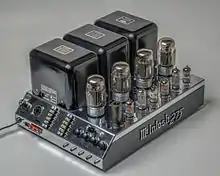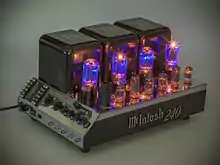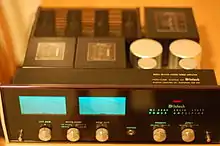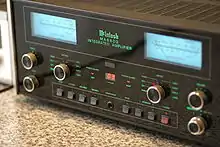McIntosh Laboratory
McIntosh Laboratory is an American manufacturer of handcrafted high-end audio equipment based in Binghamton, New York. The company was founded in 1949 by Frank McIntosh.[1]
 | |
| Type | Corporation |
|---|---|
| Industry | Electronics |
| Founded | 1949 |
| Headquarters | Binghamton, New York, United States |
Key people | Frank McIntosh, Founder |
| Products | Audio equipment |
| Parent | McIntosh Group |
| Website | mcintoshlabs.com |
Company history
In 1946 Frank McIntosh, a design consultant for broadcast and TV stations, hired Gordon Gow to help him design a high power, low distortion amplifier for his clients. This amplifier would become the 50W-1. It included McIntosh’s first patented circuit, the Unity Coupled Circuit, still used by current products.[1]
In 1956, the company moved to its current location of 2 Chambers Street, Binghamton, New York.[2]
Dave O'Brien joined McIntosh in 1962. He led the McIntosh Amplifier Clinics for the next 30 years.
McIntosh created a Loudspeaker division in 1967.[3]



| Year | Selected products |
|---|---|
| 1949 | 50W-1 power amplifier |
| 1950 | AE-1 preamplifier |
| 1953 | A116 power amplifier, C108 preamplifier |
| 1954 | MC30 power amplifier, C4 preamplifier |
| 1957 | MR55 AM-FM tuner |
| 1960 | MC240 stereo power amplifier |
| 1961 | MC275 stereo power amplifier |
| 1962 | MX110 Tuner-preamplifier |
| 1963 | MR67 tuner |
| 1963 | MR71 tuner |
| 1964 | C24 preamplifier |
| 1965 | MC250 solid state power amplifier, MAC1500 receiver |
| 1967 | MC2100, MC2105, MC2505 solid state power amplifiers |
| 1968 | MX112 solid-state tuner-preamplifier |
| 1970 | ML1, ML2, ML4 loudspeaker line |
| 1971 | MC2300 power amplifier |
| 1972 | MR78 tuner |
| 1980 | MC2500 power amplifier, XRT20 loudspeaker system |
| 1985 | MCD7000 CD player |
| 1999-2000 | MC2000 50th Anniversary New Millenium Edition (1949-1999) |
| 2003 | MC501 monoblock amplifier |
| 2004 | MC275 Mark V amplifier, XLS loudspeaker |
McIntosh amplifiers were used at the Woodstock Music Festival in 1969.[4]
The Grateful Dead's "Wall of Sound" reputedly used forty-eight 300-watt per channel McIntosh model MC 2300 solid state amplifiers for a total of 28,800 watts of continuous power.[5]
Frank McIntosh retired in 1977 and Gordon Gow became President of McIntosh.[6]
More notable products
Early 1970s: MC 2300 Power Amplifier, 300 WPC Early 1980s: MC 2500 Power Amplifier, 500 WPC Power Guard and similar chassis to MC 2300 Around 1990: MC 2600 Power Amplifier, 600 WPC Power Guard final version on MC 2300 Chassis Around 1990: MC 7300, 300 WPC and much smaller than MC 2300
Japanese years

The company was purchased by Japanese car audio maker Clarion in 1990. McIntosh components, particularly the early tube models, are highly regarded in Japan. In a speech shortly after the purchase, Clarion president Yutaka Oyamada told McIntosh employees, "...we like McIntosh as it is, and we have no intention of changing what has made it so successful."[7] Since the Clarion purchase, McIntosh has expanded into car audio and home theater.
In May 2003, McIntosh was sold by Clarion to D&M Holdings, also of Japan. McIntosh continues to operate independent engineering, design, and production operations in accordance with the company's tradition.
Italian years
On October 8, 2012, Fine Sounds SpA of Milan, Italy announced it had purchased McIntosh.[8]
Return to the United States
In May 2014, the CEO of Fine Sounds Group along with the President of McIntosh Labs led a management buyout of the Fine Sounds Group from its Italian investment firm owner, Quadrivio Investment Group.[9] Since then Fine Sounds group has renamed itself McIntosh Group and relocated from Milan to New York.[10][11]
Competition
In the all-tube receiver-amplifier 1970s, competition in audio products for McIntosh came from Fisher, H H Scott, Marantz, and Harman Kardon. For the present day historical audio collector, McIntosh is the most valued when measured by marketplace prices.
Car audio
While car audio is no longer included in their current catalog, models once available include a CD changer, CD changer/AM/FM controller, and an external DAC.
Unique features such as the Fast Responding Wattmeter and the patented Power Guard circuitry set their amplifiers apart from others' products; various models were available offering from 75 to 2,000 watts, divided amongst one to six channels. High quality power supplies, powerful circuit topologies, and balanced inputs completed each amplifier.
At the end of the chain used to lie their hand-built drivers, which came in standard 5 1⁄4-inch and 6 1⁄2-inch nominal sizes. All applicable car products were finished with McIntosh's signature glass plate displays.
A few vehicles were available from the factory with McIntosh sound systems, including Subaru Legacy and Outback models (starting from the BH & BE Legacy chassis) and the 2005–2006 Ford GT.
References
- "McIntosh | Heritage". Mcintoshlabs.com. Archived from the original on 2011-03-06. Retrieved 2013-08-19.
- "McIntosh | Heritage". Mcintoshlabs.com. Archived from the original on 2011-03-06. Retrieved 2013-08-19.
- "McIntosh | Heritage". Mcintoshlabs.com. Archived from the original on 2011-03-06. Retrieved 2013-08-19.
- "Grateful Dead and the Wall of Sound". Wallofsound.ws. 1974-05-17. Retrieved 2013-08-19.
- "McIntosh | Heritage". Mcintoshlabs.com. Archived from the original on 2011-03-06. Retrieved 2013-08-19.
- "McIntosh Laboratory Part 2". Roger-russell.com. Retrieved 2013-08-19.
- "Fine Sounds Group Acquires McIntosh Laboratory". The Absolute Sound. 2012-10-08.
- "Grange and Randall Lead Management Buyout of Fine Sounds Group in Partnership with LBO France and Yarpa". marketwatch.com. 2014-05-09.
- "McIntosh Group company profile". mcintoshgroup.com. Retrieved 2017-01-23.
- "Fine Sounds Group changes name to McIntosh Group". Twice.com. 2016-08-10.
External links
| Wikimedia Commons has media related to McIntosh Laboratory. |
- Official website
- McIntosh Resource @ The High Fidelity Museum